- Home
- Charles L. Grant
Riders in the Sky - [Millennium Quartet 04] Page 14
Riders in the Sky - [Millennium Quartet 04] Read online
Page 14
“You didn’t tell them about you,” she says.
“Nope.”
She bumps him with her shoulder. “You afraid they’ll run off?”
“They’ll think I’m nuts.”
“Oh, for ...” She takes a long drink, makes a face, and pushes her glass away. “John, they have been on the road for nearly three years, looking for a man they know did something special. Something kind of like what you did. What in God’s name makes you think they’re gonna think you’re nuts?”
He doesn’t answer.
He can’t answer.
Even now, all this time later, he wakes up in the middle of the night and sees his young son on the back of a huge palomino, a little kid in a cowboy suit who isn’t a kid at all, trying to ride him down. Trample him. Kill him. That the boy was adopted doesn’t make much of a difference in the middle of the night—Joey is his son, and his son tried to kill him.
“I’ve been thinking something else,” she says, briefly leaning her head against his shoulder.
“Spare me.”
“Hush.”
“You’re thinking in threes, I’ll bet.”
She nods, and winces when one of the name tag men yells at the jazz trio to shut it down, are they drunk and blind, can’t they see there’s an important game going on?
“If Casey is one, and I’m another, and we’re talking about Death and Famine ... who’s the third?”
She hesitates before answering, “I’ve got a better one for you: If there’s three, and it’s what we think it is, who’s the fourth?”
* * * *
7
“Lady Harp?”
“Yes, dear?”
“Do we really have to go?”
“Yes, dear, I’m afraid we do.”
“But I like it here. The school’s neat, and Star’s got a boyfriend, and Momma, she even goes out again.”
“I know, dear, but we have to go.”
They stand outside a small Missouri cottage, the girl scowling, the woman searching the stars for something to guide her.
“I like it here,” Moonbow says softly.
Beatrice Harp can’t respond to that. She likes it here, too. After all the driving, all the hunting for something to which she could not put a name, it was nice to settle down for a while, to pretend all was well, that once the new smallpox had run its course, all, in fact, would be well.
If it hadn’t been for the fighting, she might have actually come to believe it.
But whatever it was that had driven her and her late husband to help a young man fight his demons in the desert, whatever that had been had returned, and she could no more ignore it than she could ignore the way the moon looked bloated and ready to burst.
“Tomorrow’s Thanksgiving,” Moonbow says miserably. “We should at least have Thanksgiving dinner.”
“We will.”
“At a diner or something, right?”
“I don’t know. But we’ll have that dinner if it means so much to you.”
The girl shrugs. Maybe it does, maybe it doesn’t, but Lady Harp should at least give them a chance to find out.
A movement at the front door turns them around.
“Momma?”
In the doorway Jude Levin stands in her nightgown, her veil still on, her hands twisting the fabric as if trying to keep it on and yank it off at the same time.
“Momma?”
“There’s a man,” says Jude anxiously. “I couldn’t sleep, every time I closed my eyes I saw a man.”
Beatrice keeps her gaze on the stars. She wonders which man Jude is talking about—the one who seems so awfully big and awfully dark, or the one who rides the horse whose hooves give off tiny fire.
* * * *
8
“Cora, please, I’m begging you—go to sleep.”
“Aren’t you the least bit curious about this guy? For all we know he could be a pervert or something.”
“Come on, you think he’s a pervert?”
“Well... no.”
“Then go to sleep.”
“He never answered my questions.”
“He was trying to feed you a decent meal, Cora. The first decent meal we’ve had in I don’t know how long. And these beds are the nicest beds we’ve slept in for months. You looking a gift horse in the mouth?”
“I’m looking, Reed, to find out what the hell’s going on here.”
“Cora.”
“Okay, okay.”
“Don’t okay. Lie down. Sleep.”
“Okay, okay, I’m lying down. You happy now? I’m lying down.”
“But you’re not sleeping.”
“Well, how can I sleep? You’re talking all the time.”
“Cora—”
“For God’s sake, Reed, how many times do I have to say I’m sorry?”
“But—”
“Shut up, Reed. Just... shut up.”
* * * *
9
Sheriff Vale Oakman likes to visit the harbor at night. Water slapping softly against hulls and pilings, lights from nearby houses reflected in the water, the hollow sound of his shoes on the planks of a pier. The smell of salt and fish, brine and oil, damp wood and old paint. A boat moves cautiously around the Hook into the bay, running lights like the lights of a large Christmas tree. From across the water, at the base of the hill, he hears music, splashing, and someone laughing, wonders who’d be so stupid, or drunk, to be swimming this late at night, this late in the season.
He makes his way past the fancy boats whose owners are preparing to put them in dry dock; he listens to a radio in a houseboat, not quite muffling the sounds of someone having a damn good time in bed; he hunches his shoulders against a gust of wind that slips through cracks in his leather jacket, ruffles the heavy fur collar, makes his nose run.
There is a small gap then, one that requires that he leave the long boardwalk and take a few steps across a rock-and-sand beach raked clear of debris. The next pier belongs to the working men. The fishermen. The charters. The boats not nearly as sleek or large or smelling of money. Five minutes, taking his time, and he reaches the berth for the Lucky Deuce, a boat he figures has about two more seasons in her before she sinks to the bottom before she leaves the bay.
Rick Jordan sits on a butterfly cleat near the bow, Ronnie Hull standing beside him, both in fleece-lined denim jackets and baseball caps, Rick smoking a cigarette, Ronnie with a beer in her hand.
“Very romantic,” Oakman says with a smile.
Ronnie looks at him, startled, not smiling at all, not pleased to be interrupted. “I suppose you came all this way just to tell me you’ve arrested the Teagues, right? For all that crap they’re doing to my father and the paper?”
The sheriff shakes his head. “Sorry, Ronnie.”
She looks away across the water; he doesn’t exist for her any longer.
“What’s up, Sheriff?” Rick says.
“Want to remind you it’s your time in the Tower. Four days, starting Monday.”
Rick stares evenly at him. “You came all this way just to tell me that?”
The boat in the bay sounds a horn and is answered by one on shore, half a mile up.
“I like the walk,” Oakman answers truthfully. “Cool, clear night, all those stars, a shooting star or two. Nothing better, right?”
“Except,” Rick says sourly around his cigarette, “if you’re stuck in the damn Tower.”
The bay that’s formed by Camoret’s southern hook is usually fairly calm unless the weather is particularly fierce. The Hook itself is higher than the rest of the island by several hundred feet and is heavily wooded. A south wind generally blows straight across, and what slips down the steep hillside is weakened by the trees it has to pass. The houses there, in several tiers formed by several narrow roads, are large. Expensive. Each on at least a two-acre plot. A splendid view of the mile-wide bay, the white beaches below, the docks that moor the boats and yachts that belong to the houses.
No one lives
along the top of the ridge. Even if the land were wide enough to hold a house, building there would invite certain disaster from hurricanes and winter storms, but there’s a watch tower there, in the middle, a steel-and-wood lattice beneath a round metal cabin open on all sides from waist-high to the eaves of the conical roof. The volunteers who work there in six-hour shifts are hired and paid by the town, not the state, to look for fire and to track storms when the alert has gone out. Not half bad in spring and summer, a bitch of a job when even the Gulf Stream can’t blunt the worst of the cold.
At the start of every season, it’s the sheriff’s job to round up the volunteers and set the rotation. In late autumn, in winter, that meant the fishermen, and the shopkeepers who close down until spring—those, that is, who don’t flee the island for someplace warmer. And anyone else who happens to feel the pull of civic duty and the chance of adventure.
Rick snaps his cigarette into the water. “I’ll be there,” he says at last.
“Good. Thanks.”
“No problem.”
There’s nothing more to say, and he walks away, hands in his pockets, listening to the water. The boat is still out there, its lights smaller as it heads toward its berth. An airliner flies over, high enough to be little more than a speeding star that leaves a rumbling behind it as it heads for the coast.
“Sheriff.”
He stops. It’s Ronnie.
“One more thing happens to my father, or the paper, I’m going to the state.”
He doesn’t turn. “No need, Ronnie.”
“He was nearly killed. If it hadn’t been for that Chisholm guy, he would have been killed.”
Oakman does turn then. “Tell me, Ronnie—if all this stuff is going on, why doesn’t he file a report? I can’t do much if he doesn’t file a report.”
“Reverend Baylor did.”
“But your father denied it. Specifically said it was all a misunderstanding.” He walks away. “Get him to stand up, Ronnie. Get him to do more than blow hot air in those editorials of his, and I’ll see what I can do.”
He keeps walking, a sudden churn of acid in his gut making him wince. One more year, he thinks; one more year and I’m out of this job and off this island. He’d even spent half the day showing Verna and Salter those Arizona brochures.
“Jeez, Vale, why Arizona?”
He had pointed at all the photographs. “Look closely, Verna. You see any damn water?”
Deputy Salter, face covered with enough freckles to make him look diseased, told about a cousin who had moved there and near died from the heat. “Dry heat, Sheriff. Not like we got here. Sucks the water right outta your body, leaves you looking like a mummy.”
Oakman had directed a pointed look at his own hefty build and spread his arms wide. “Jesus, Dwight, you think I’m worried about losing a few pounds? No water, weight loss, sounds like hog heaven to me.”
He doesn’t hear Ronnie’s footsteps until she’s grabbed his arm and yanks him around.
“Well, tell you what, Sheriff,” she says, making his title sound like an obscene curse, “the next time Stump
Teague or any of his brothers walks into my place of business, I’m going to shoot first and file a report later, you hear me?”
“Now, Ronnie, no call—”
“I’m going to kill him, Sheriff. I’m telling you right now I’m going to kill that little snake before he kills my father.”
* * * *
10
The living room is spare. An old couch and an easy chair face an old television set, a table between them that holds an ash tray; a brass floor lamp in the corner, faded prints on the walls, faded carpet on the floor. Against the back wall a low bookcase, filled with magazines and books and three different Bibles, all of them well used.
Senior Raybourn has taken some time off; Ben didn’t give him any trouble, told him to take as much time as he needed. Senior appreciated that because something’s wrong with his son, something he can’t figure out. It would be easier if the boy would talk, but Junior won’t come out of his bedroom to explain, has been there since last night. He sits on his bed and rocks back and forth, humming softly, left hand at his shoulder, fingers weaving the air. As far as the old man can tell, his son hasn’t been hurt, no bruises or scratches, but nothing Senior has done has made the boy speak, and now he paces the living room, gnawing lightly at his lower lip.
Please, Lord, he prays; please, Lord.
All Hector told him was that Junior had come back from a delivery, had said something remarkable about some thermometer in the luncheonette’s kitchen, then wouldn’t do any more work, only whisper-pleaded for his father.
The delivery was to the big man who lives in the house on Midway Road, off right and behind Senior’s backyard.
Senior wants to be angry, but what’s the point? He’s old, he can’t fight, and that man is a giant, could swat him down like a fly.
Please, Lord.
The last time he had seen Junior like this, it was years ago, when they had been walking along the beach and a whale breached out beyond the jetty. Scared the poor boy half to death, gave him fits and nightmares; he wouldn’t eat for two days, wet his pants, wet his bed. The clinic doctor—damn toad Alloway with his thick glasses and fat lips, eyes that looked like a fish about to die—he couldn’t do nothing for the boy, started talking about sending him away, put him in a place where people knew about things like this. Senior had never talked so hard and fast in his life, finally convinced the doc that he could take care of his son better than any stranger. Alloway, reluctantly, finally agreed, and Senior had prayed and cleaned and held his son and it wasn’t long before he was back to himself.
He wasn’t so sure now, though, he could handle another time like that. He was old. His back wasn’t so good anymore, his knuckles ached after working all day, and his eyes weren’t so good either.
If anyone found out Junior was this way again, they’d take him away for sure.
They’d take him away, and Senior would die.
Please, Lord, please.
A footstep in the hallway stopped the pacing. He turned just as Junior reached the doorway, stood there looking around until he saw his father.
“Daddy?”
“What is it, son? Are you all right? What is it?”
“Scary.”
Senior swallowed the urge to cry. “What is, boy? What’s scary? What that man do to you, huh? That man do something to you, son?”
Junior shook his head quickly, shifted his weight from foot to foot, then crossed the room to the bookcase, hands on hips, scanning the shelves.
Senior closed his eyes briefly. “Junior.”
Junior picked up a magazine and sat on the couch, flipped the pages front to back, looked up and smiled. “I like this,” he said.
“I know, son. Pretty pictures.”
Junior shook his head, His lips moved for several seconds before he said, “No, Daddy, pretty words.”
“Junior...” Please, Lord, give me strength. “Junior. Son.” He dropped into his chair, did his best to keep his old eyes from tearing up. Gripped his knees with his hands to keep the fingers from trembling. “Son, words aren’t pretty, not like the pictures. You can’t look at them like that, son.”
“But they say pretty things, Daddy.”
Oh, Lord.
“Junior... Junior, how do you know that? You can’t hardly read.”
And Junior said, “Yes, I can, Daddy. Sure, I can. Every word. You want to hear?”
* * * *
11
Norville Cutler stands by the register in the eastbound Last Stop, opening and closing the drawer. He can hear the sea trying to tear at the barriers between it and the building. Can feel the building shudder slightly when the waves are high.
One light overhead.
No lights outside.
Not a car or truck has passed in at least an hour, in either direction.
The fish mounted on the walls seem larger, their eyes not s
o dead, not so black.
He should be home now, listening to Mandy taunting him from upstairs, her voice husky as she tells him what she’s wearing, or what she’s not wearing, what she’s going to do to him once he gets into the bedroom. Or the hall. Or the top of the stairs. He should be home, but he doesn’t need the distraction. He needs to think. He needs to think hard, because he’s beginning to feel it’s all on the edge, ready to fall one way or the other, and he doesn’t like the feeling that it’s going to fall the wrong way, come apart before he can do anything about it.

![[Oxrun Station] The Orchard Read online](http://i1.bookreadfree.com/i/03/17/oxrun_station_the_orchard_preview.jpg) [Oxrun Station] The Orchard
[Oxrun Station] The Orchard![Riders in the Sky - [Millennium Quartet 04] Read online](http://i1.bookreadfree.com/i/03/20/riders_in_the_sky_-_millennium_quartet_04_preview.jpg) Riders in the Sky - [Millennium Quartet 04]
Riders in the Sky - [Millennium Quartet 04]![Chariot - [Millennium Quartet 03] Read online](http://i1.bookreadfree.com/i/03/19/chariot_-_millennium_quartet_03_preview.jpg) Chariot - [Millennium Quartet 03]
Chariot - [Millennium Quartet 03]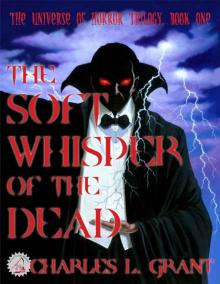 The Universe of Horror Volume 1: The Soft Whisper of the Dead (Neccon Classic Horror)
The Universe of Horror Volume 1: The Soft Whisper of the Dead (Neccon Classic Horror)![[Oxrun Station] Dialing The Wind Read online](http://i1.bookreadfree.com/i/03/19/oxrun_station_dialing_the_wind_preview.jpg) [Oxrun Station] Dialing The Wind
[Oxrun Station] Dialing The Wind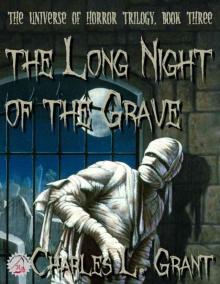 The Universe of Horror Volume 3: The Long Night of the Grave (Neccon Classic Horror)
The Universe of Horror Volume 3: The Long Night of the Grave (Neccon Classic Horror)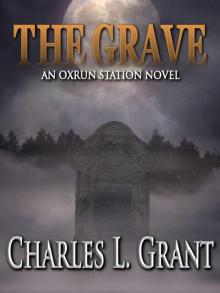 The Grave - An Oxrun Station Novel (Oxrun Station Novels)
The Grave - An Oxrun Station Novel (Oxrun Station Novels)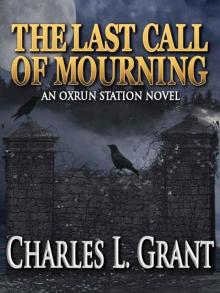 The Last Call of Mourning - An Oxrun Station Novel (Oxrun Station Novels)
The Last Call of Mourning - An Oxrun Station Novel (Oxrun Station Novels)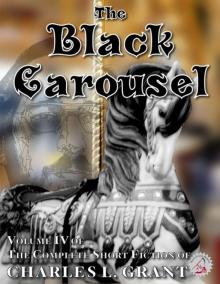 The Complete Short Fiction of Charles L. Grant, Volume IV: The Black Carousel
The Complete Short Fiction of Charles L. Grant, Volume IV: The Black Carousel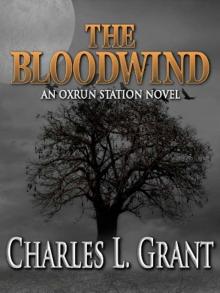 The Bloodwind - An Oxrun Station Novel (Oxrun Station Novels)
The Bloodwind - An Oxrun Station Novel (Oxrun Station Novels)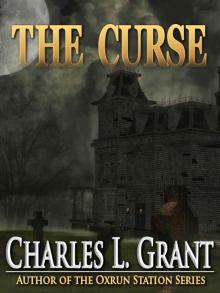 The Curse
The Curse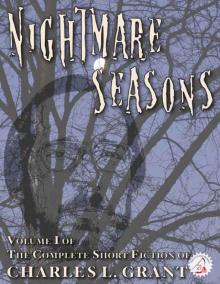 The Complete Short Fiction of Charles L. Grant Volume 1: Nightmare Seasons (Necon Classic Horror)
The Complete Short Fiction of Charles L. Grant Volume 1: Nightmare Seasons (Necon Classic Horror)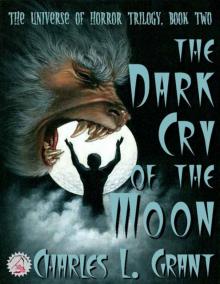 The Universe of Horror Volume 2: The Dark Cry of the Moon (Neccon Classic Horror)
The Universe of Horror Volume 2: The Dark Cry of the Moon (Neccon Classic Horror)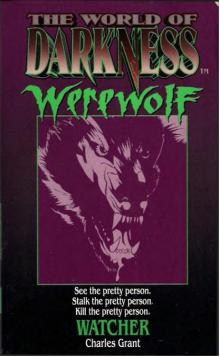 Watcher: Based on the Apocalypse (World of Darkness : Werewolf)
Watcher: Based on the Apocalypse (World of Darkness : Werewolf)![[Oxrun Station] The Bloodwind Read online](http://i1.bookreadfree.com/i/03/25/oxrun_station_the_bloodwind_preview.jpg) [Oxrun Station] The Bloodwind
[Oxrun Station] The Bloodwind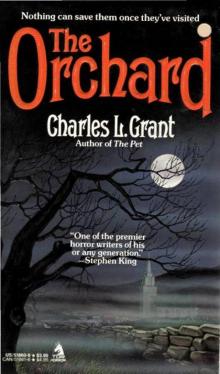 The Orchard
The Orchard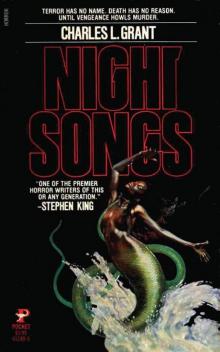 Night Songs
Night Songs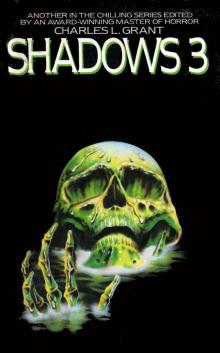 Shadows 3
Shadows 3![Symphony - [Millennium Quartet 01] Read online](http://i1.bookreadfree.com/i1/04/02/symphony_-_millennium_quartet_01_preview.jpg) Symphony - [Millennium Quartet 01]
Symphony - [Millennium Quartet 01] The Hour of the Oxrun Dead (Necon Classic Horror)
The Hour of the Oxrun Dead (Necon Classic Horror)![In the Mood - [Millennium Quartet 02] Read online](http://i1.bookreadfree.com/i1/03/31/in_the_mood_-_millennium_quartet_02_preview.jpg) In the Mood - [Millennium Quartet 02]
In the Mood - [Millennium Quartet 02]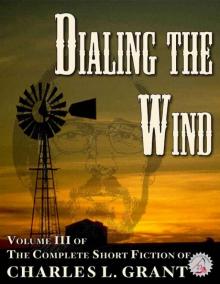 The Complete Short Fiction of Charles L. Grant Volume 3: Dialing the Wind (Neccon Classic Horror)
The Complete Short Fiction of Charles L. Grant Volume 3: Dialing the Wind (Neccon Classic Horror)![[Oxrun Station] The Last Call of Mourning Read online](http://i1.bookreadfree.com/i2/04/05/oxrun_station_the_last_call_of_mourning_preview.jpg) [Oxrun Station] The Last Call of Mourning
[Oxrun Station] The Last Call of Mourning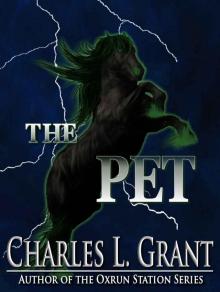 The Pet
The Pet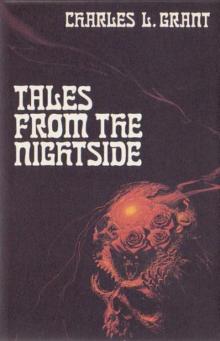 Tales from the Nightside
Tales from the Nightside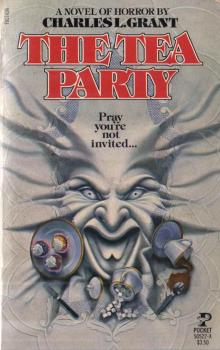 The Tea Party - A Novel of Horror
The Tea Party - A Novel of Horror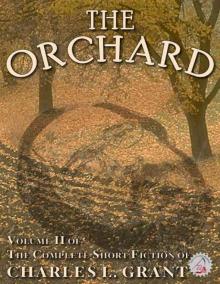 The Complete Short Fiction of Charles L. Grant Volume 2: The Orchard (Necon Classic Horror)
The Complete Short Fiction of Charles L. Grant Volume 2: The Orchard (Necon Classic Horror) Whirlwind
Whirlwind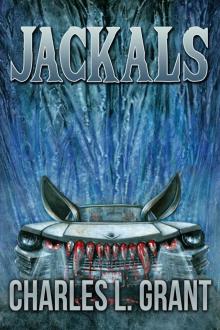 Jackals
Jackals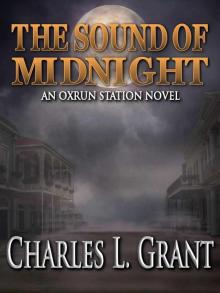 The Sound of Midnight - An Oxrun Station Novel
The Sound of Midnight - An Oxrun Station Novel